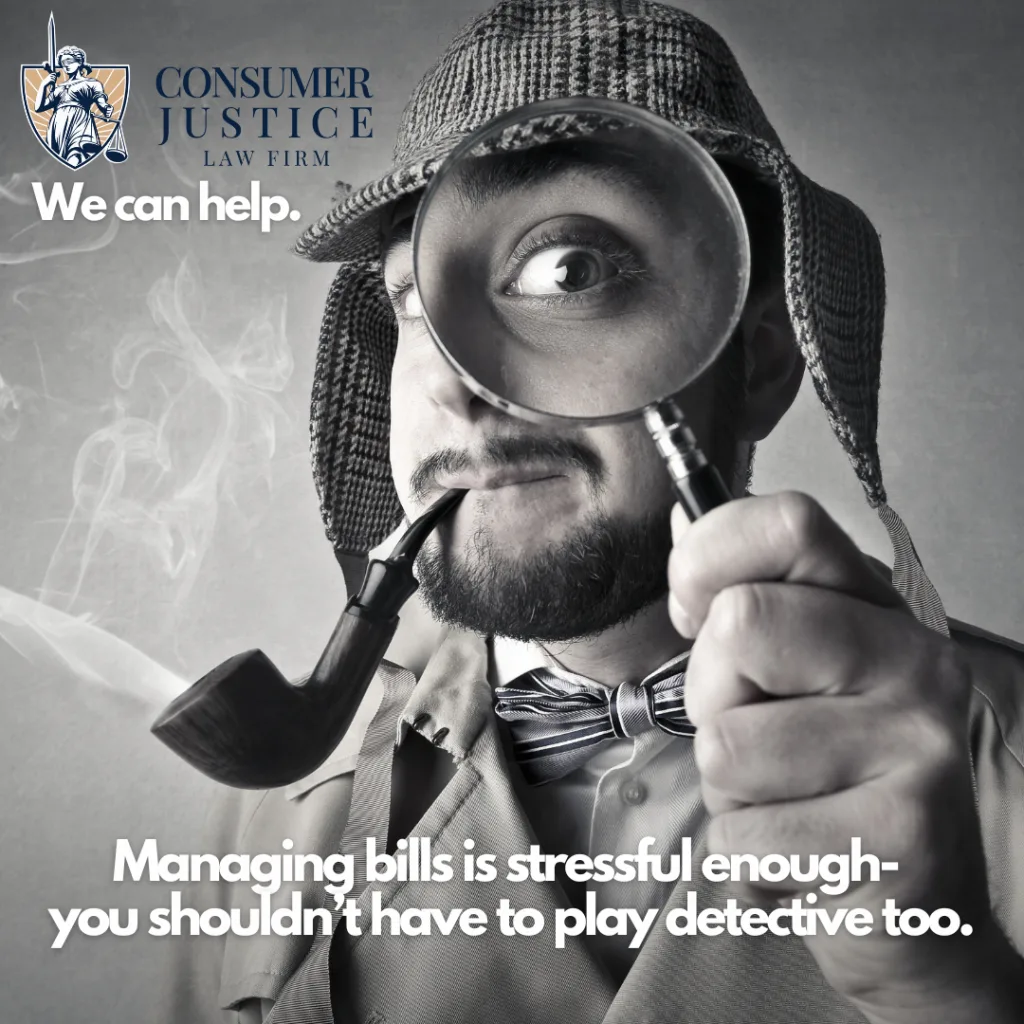Mistakes in your monthly billing statements are frustrating and potentially overwhelming. But the good news is, there are federal laws designed to protect you, ways to dispute charges, and legal help is just a click away. At Consumer Justice Law Firm, our team of dedicated consumer protection attorneys can help you understand your rights and take action when things go wrong.
What should you do if there are incorrect transactions on your monthly statement? Gather evidence, dispute charges, and fight back to protect your finances and your credit score! Let’s break it down.
Quick Links
Which Law Protects Against Errors on Billing Statements?
Think your only option is to argue with customer service until someone finally listens? Not quite! There are two (and more!) federal laws that were enacted to help consumers fight back against the types of data and billing errors that can harm their finances and credit scores.
The Fair Credit Billing Act
The Fair Credit Billing Act (FCBA) is one of the Federal Laws that provides protection when an error occurs on a monthly statement.
If you’ve ever been billed twice, charged the wrong amount, or spotted a transaction you didn’t authorize, the FCBA is your legal backup.
You’re probably still thinking: Wait, what is the Fair Credit Billing Act, exactly? Glad you asked! The FCBA gives you the power to dispute charges on credit card statements that are incorrect, inaccurate, or false. It also lets you pause payment on the charge while it’s under investigation and mandates that you actually get a timely response from your creditor. Imagine that.
The Electronic Funds Transfer Act
If the mistake shows up on your bank statement (as opposed to a billing statement) as an unauthorized withdrawal or electronic payment gone rogue – the Electronic Funds Transfer Act (EFTA) comes in. It offers similar protections for debit card and bank account errors, making sure you’re not left on the hook for someone else’s slip-up. If you want to drill down for more detailed information, the Consumer Financial Protection Bureau has a FAQ sheet on the EFTA.
Between the FCBA and the EFTA, you have powerful tools on your side to catch billing errors, dispute charges, and correct things before they snowball. These laws exist to ensure you aren’t stuck paying for someone else’s mistake or worse, watching a system glitch damage your finances.

No Justice, No Fee! Consultations are always free, we charge you NOTHING out of pocket, and we only get paid when you get justice. The companies we sue pay the legal bills, not you.
4 Steps to Fix an Error on Your Monthly Billing Statement
Once you spot an error on your credit card or bank statement, the clock starts ticking. Under the FCBA, you usually have about 60 days from the date of your statement to report the problem and dispute charges. Taking swift, organized action can protect your rights and improve your chances of resolving the error quickly.
Here are a few simple steps to take if you find a mistake:
- Review your billing statement carefully, looking for charges you don’t recognize, duplicates, or incorrect amounts.
- Gather any documentation that supports your claim, such as receipts, confirmation emails, or bank notifications.
- Dispute charges using the guidelines required by the specific bank or creditor. Include your name, account numbers, the exact errors, and why you believe the statement is incorrect.
- When you dispute charges, it’s recommended that you forward your dispute through certified mail with a return receipt requested because this helps prove the company received it.
After receiving your letters, the creditor has an obligation to acknowledge that you want to dispute charges within thirty (30 days) and to fix the issues within two billing cycles (not more than 90 days – 3 months). You’re not obligated to pay the disputed amount while your claim is under review, but you should continue paying the rest of your bill to avoid late fees or damage to your credit score.
If the process feels overwhelming or if your request to dispute charges is ignored, consulting a credit lawyer is likely the best next step.
Top Tip! There’s a limited time to report billing errors under the law. It’s critical to review your statements and act quickly. Delays can impact key protections.
If You Dispute Charges, How Does the Error Still Hurt Your Credit?
One of the most frustrating things consumers face is when they dispute charges and a billing error is removed only to reappear later on their credit report. Unfortunately, this happens more often than most people realize, and it’s usually because of flawed reporting systems or improper handling of your file when you dispute charges.
Here’s why errors can keep showing up even after you dispute charges-
- The original creditor re-reports the same inaccurate information
- The credit bureau fails to permanently correct the data
- The reinsertion process bypasses required notification rules
- Automated systems overwrite manual corrections
Under the Fair Credit Reporting Act, credit bureaus are required to notify you if a previously deleted item is reinserted but they don’t always follow through. If you dispute charges multiple times and they keep coming back, you may be dealing with a deeper compliance issue that requires legal support.
A Fair Credit Reporting Act lawyer can step in, force the credit bureau to fully investigate, and help ensure that once you dispute charges and an error is removed, it stays that way.
Does the Fair Credit Reporting Act Protect You from Billing Errors?
Spot billing errors and now you have a credit reporting error? Yep – unfortunately, one can lead to the other.
The Fair Credit Reporting Act doesn’t directly cover billing statements, but it becomes crucial when a billing error starts affecting your credit. Let’s say there are charge you didn’t authorize. You dispute charges and don’t pay the amount in dispute, but suddenly it’s reported as a late payment. That’s when your credit reports and your credit scores – take the hit.
Do Billing Errors Actually Result in Credit Reporting Errors?
Unfortunately, yes! This is exactly where the FCRA steps in. It requires credit bureaus like Experian, Equifax, and TransUnion to maintain accurate credit reports. If you dispute charges on a billing statement that are in error but they end up on your credit file, you have the right to dispute the credit information directly with the credit bureaus. They credit bureaus are required by law to investigate your claim, typically within 30 days.
The problem? Many consumers discover that even after they dispute charges multiple times, the incorrect information stays put. That’s when it’s time to get help from a credit report lawyer. They can push your claim forward and, when necessary, take legal action to make sure your credit report reflects the truth – not someone else’s error.
You can learn more about your rights under the FCBA and how our legal team can help by visiting our Fair Credit Billing Act violations page.

Did You Know? Billing errors aren’t always obvious. Some billing errors are easy to miss especially if you’re quickly skimming your credit card statement or bank statement each month. Spotting errors quickly can protect your wallet, your credit, and your peace of mind.
6 Common Types of Billing Errors You Should Watch Out For
Here are a few common billing mistakes that require consumers to dispute charges and other transactions
- Duplicate charges for a single purchase
- Unauthorized or unfamiliar transactions
- Charges for canceled subscriptions or services
- Incorrect billing amounts or transaction dates
- Items returned or refunded but still showing up as charges
- ATM withdrawals or electronic transfers you didn’t authorize
If something seems off, it’s always worth a second look. Even legitimate-looking transactions could be errors, especially if a merchant processed a charge incorrectly or your information was compromised.
How Billing Errors Impact Your Everyday Life
Billing errors are more than a nuisance. They can interrupt your finances, impact your credit, and create unnecessary stress. A small mistake on your statement could mean the difference between paying your rent on time or falling behind. Overdraft fees, declined payments, or frozen cards can all stem from unresolved billing issues.
Incorrect transactions can even cause missed job opportunities if they lead to a credit issue that gets flagged during a background check. That is why it is important to act fast and document everything. When you dispute charges to protect your billing records, you are also protecting your financial stability. These financial disruptions can ripple into other areas of life too.
You may find yourself borrowing money unexpectedly, delaying important purchases, or feeling anxious about checking your account altogether. What seems like a one-time glitch can create long-term emotional and financial stress if not handled properly. Taking billing errors seriously can protect your credit standing, your reputation with creditors, and your ability to qualify for future loans, housing, or employment.
How a Consumer Protection Attorney Can Help
If you have already tried to fix a billing error and hit a wall, it may be time to speak to a consumer protection attorney. A consumer lawyer can step in to work directly with your creditor, your bank, or the credit bureaus to make sure the issue is addressed correctly.
Consumer lawyers understand how to apply the Fair Credit Billing Act and Fair Credit Reporting Act to your advantage. They know how to dispute charges, escalate your claim, force compliance with the law, and help you get compensation when appropriate.
An attorney can also help you understand whether a billing error is part of a larger issue such as fraud or identity theft. With legal support, you do not have to keep fighting the same battle over and over again. You get accurate records, with the power of the law behind you.
Get Justice: Dispute Charges to Fix Monthly Billing Errors and Credit Reporting Errors
If you’ve been dealing with incorrect transactions on your monthly statement, you don’t have to accept the consequences of someone else’s mistake. Our legal team at Consumer Justice Law Firm has helped clients across the country fix billing issues and credit report inaccuracies and we’re ready to help you too.
Here’s what we help clients do every day:
- Dispute charges with banks, credit card companies, and credit bureaus
- Delete incorrect late payments or collections from credit reports
- Hold companies accountable under the FCBA, FCRA, and EFTA when they violate consumers’ rights
- Assist with correcting personal information inaccuracies that appear on credit reports
- Provide legal representation in cases of identity theft or financial fraud
- Support consumers in recovering damages related to credit and billing errors
- Ensure credit bureaus and furnishers follow through with proper investigations and reporting standards
Whether it’s a $50 charge you know you didn’t make or a $1,500 error that tanked your credit completely, we’ll work with you to get it resolved and give you back control.
Searching for “consumer protection attorneys near me”? Yep, that’s us. No matter where you live, if you need a consumer lawyer near me, we’re it. Because our law firm is national, we’re always local.
Need to Take Action Today?
Billing error? Ignoring it won’t make it disappear.
Invalid charges adversely impact your finances and credit. If you’ve noticed an error on your monthly billing statement, don’t wait it out – take action. Review the transaction, gather your documentation, dispute charges with a written letter (preferably via certified mail), and track the response timeline closely.
If the mistake has already affected your credit report, it’s not too late. Our team of credit attorneys will help correct the issue and hold the responsible parties accountable.
Let’s fix the problem and make sure your credit gets the clean slate it deserve. We are here to guide you through every step, answer your questions, and secure the financial clarity you deserve. The sooner you act, the stronger your position becomes.